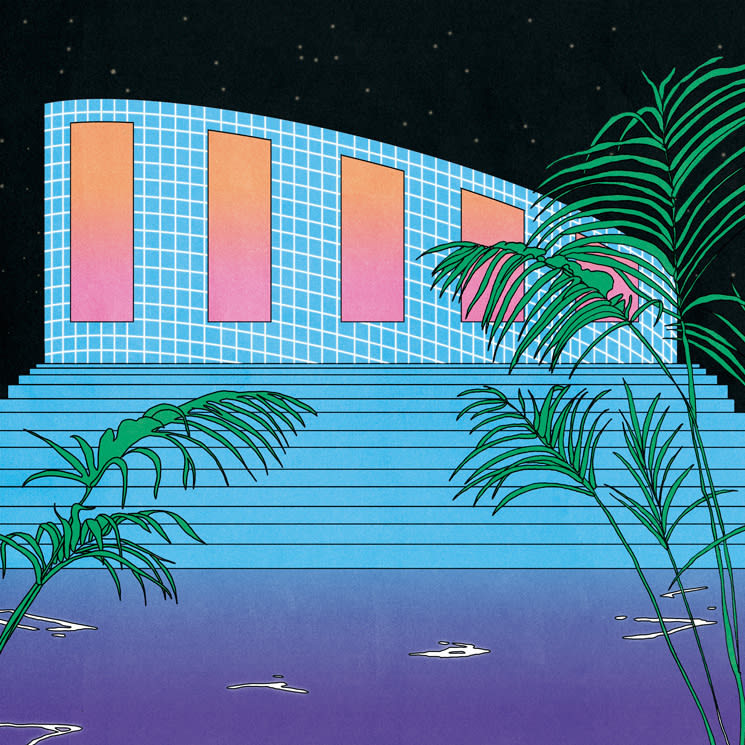Interior, the newest release from British Columbia's Teen Daze, finds producer Jamison Isaak succeeding his signature realist ambiance with French house-inspired kicks and bitcrushed samples. It's a danceable deep-dive into some of Isaak's first inspirations, and a demonstration of his mastery of production methods both old-school and contemporary.
With this artistic expansion in mind, Interior still retains the gentle palatability of previous Teen Daze releases. A decade of globe-trotting and producing "soft-focus synth pop and romantic electronica" gradually revealed to Isaak what role Teen Daze plays in his life: "dream fulfillment." He describes Interior as "an album of first loves refracted through prisms of wisdom, wounds, and wonder."
These refractions are rarely more apparent than on lead single "Swimming", whose four on the floor beat and sidechained ambience is adorned with skittering electronic chirps. Another standout track, "Nite Run" pleasurably disorients the listener in a cloud of finger-tapping samples, until a kick bristling with late-evening energy punches proudly through the mix.
Interior recalls Teen Daze's 2015 EP A World Away, which also draws upon European dance music for inspiration, juxtaposing wide-open synth pads and hopeful arpeggios against 909-reminiscent beats. To its merit, Interior feels immediately more robust and multidimensional than that aforementioned effort, showcasing Isaak's growing understanding of the legacy production methods behind iconic house tracks.
The production on Interior speaks to Isaak's fascination with the individual sounds that make up his music and the sense of cohesion they can lend. Field recordings of running water, the hiss of hi-hats and white noise, as well as delicate vocal processing unite these tracks with one another. Joseph Shabason's ethereal saxophone on album opener "Last Time In This Place" sets the stage for the funk-inspired lines on album closer "Translation".
While getting back in touch with some of his earliest inspirations may have brought out a more beat-forward side of Isaak's production, Interior actually expands upon the width and density indicative of earlier releases in the Teen Daze catalog.
On late-album interlude "Still Wandering", delicious aliasing combs the ear amidst a sheen of vocals processed past intelligibility, before dropping into the Cecile Believe-assisted "2AM (Real Love)." As the only track on the record to unabashedly lead with its house music influence, this is when Interior really expands into that style's celebratory space. "I feel it coming slowly / like a window gently opening" sings Believe in a tone-bent undersing, dripping with the coolness of a hot dancefloor. It is hard not to wish that this energy and sure-footedness had announced itself earlier.
Less about injecting four-on-the-floor dance rhythms into the Teen Daze sound or detouring through them, Interior highlights French house as one of the primary reasons for Isaak's transfiguration into Teen Daze, alluding to dance music's much celebrated power as catalyst for personal awakening. Reverse engineering the methods behind the iconic dance genre brings Teen Daze into focus.
(Cascine)With this artistic expansion in mind, Interior still retains the gentle palatability of previous Teen Daze releases. A decade of globe-trotting and producing "soft-focus synth pop and romantic electronica" gradually revealed to Isaak what role Teen Daze plays in his life: "dream fulfillment." He describes Interior as "an album of first loves refracted through prisms of wisdom, wounds, and wonder."
These refractions are rarely more apparent than on lead single "Swimming", whose four on the floor beat and sidechained ambience is adorned with skittering electronic chirps. Another standout track, "Nite Run" pleasurably disorients the listener in a cloud of finger-tapping samples, until a kick bristling with late-evening energy punches proudly through the mix.
Interior recalls Teen Daze's 2015 EP A World Away, which also draws upon European dance music for inspiration, juxtaposing wide-open synth pads and hopeful arpeggios against 909-reminiscent beats. To its merit, Interior feels immediately more robust and multidimensional than that aforementioned effort, showcasing Isaak's growing understanding of the legacy production methods behind iconic house tracks.
The production on Interior speaks to Isaak's fascination with the individual sounds that make up his music and the sense of cohesion they can lend. Field recordings of running water, the hiss of hi-hats and white noise, as well as delicate vocal processing unite these tracks with one another. Joseph Shabason's ethereal saxophone on album opener "Last Time In This Place" sets the stage for the funk-inspired lines on album closer "Translation".
While getting back in touch with some of his earliest inspirations may have brought out a more beat-forward side of Isaak's production, Interior actually expands upon the width and density indicative of earlier releases in the Teen Daze catalog.
On late-album interlude "Still Wandering", delicious aliasing combs the ear amidst a sheen of vocals processed past intelligibility, before dropping into the Cecile Believe-assisted "2AM (Real Love)." As the only track on the record to unabashedly lead with its house music influence, this is when Interior really expands into that style's celebratory space. "I feel it coming slowly / like a window gently opening" sings Believe in a tone-bent undersing, dripping with the coolness of a hot dancefloor. It is hard not to wish that this energy and sure-footedness had announced itself earlier.
Less about injecting four-on-the-floor dance rhythms into the Teen Daze sound or detouring through them, Interior highlights French house as one of the primary reasons for Isaak's transfiguration into Teen Daze, alluding to dance music's much celebrated power as catalyst for personal awakening. Reverse engineering the methods behind the iconic dance genre brings Teen Daze into focus.
